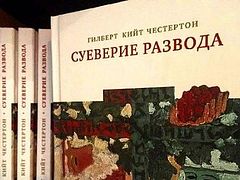It is a staple of the LGBTQ assault on the Church’s traditional condemnation of homosexual activity that by this condemnation the Church is singling out homosexuals for special treatment. In particular, it is pointed out that Christ condemns divorce in unequivocal terms and yet the Church easily allows divorce and accepts divorced people into its communion, so why should it not also accept practising homosexuals? Thus Protodeacon Feldman in his recent piece in Orthodoxy in Dialogue: “We hear calls for LGBTQ+ persons to remain celibate, lest they knowingly persist in sin. ‘Practicing’ homosexuals, we are told, are ‘living in sin.’ But couples who have divorced and remarried, according to Christ’s teaching, are likewise living in sin…We are all living in sin. This is fundamental to our faith.”
The Protodeacon’s point here, like his piece as a whole, stops just short of coherency, and he seems unaware that repentance is required of everyone before approaching the Chalice. But he does make a good point about divorce: Christ forbids divorce as clearly as the Law (and St. Paul) forbid homosexual practice, so why does the Church not ban divorced persons from the Chalice as well as practising homosexuals? It is important then that we examine the Scriptural teaching about divorce and the Church’s contemporary pastoral practice regarding divorced persons. We note in passing that agreement with the Protodeacon’s objection means not that we should admit practising homosexuals to Communion, but should not admit unrepentant divorced persons. One senses that the Protodeacon is less concerned that the Church be consistent than he is that the Church should accept homosexual lifestyle.
We begin an examination of the teaching of Christ. In Matthew 19:3-12 and Mark 10:2-12 the Pharisees approach Jesus with a question regarding a difference in Rabbinical interpretation of the Law. Deuteronomy 24:1-4 presupposes the legitimacy of divorce, and attempts to elevate the status of women by forbidding that a divorced wife who has remarried and then been divorced again be accepted back by the first husband as if she were mere chattel. Referring to the first divorce, Deuteronomy 24:1 says that it was caused by the husband finding “some indecency in her”—literally, “an indecent thing in her”, Hebrew ‘erwat dabar. What did this phrase mean? What did the Law say was a sufficient cause for divorce?
There were two main Rabbinical schools of thought: the school of Hillel insisted that the phrase meant that the husband could divorce his wife for anything at all that displeased him; the stricter school of Shammai insisted that the phrase limited the reason for divorce to sexual misconduct of some sort. The Pharisees approached Jesus asking, “Is it permitted for a man to divorce his wife for any reason whatsoever?”—i.e. do You side with the popular view of the school of Hillel? It is unlikely that the question was motivated by mere curiosity, for St. Matthew said that they asked this question, “tempting Him” (Matthew 19:3). The Pharisees probably had in mind the divorce of Herod Antipas which proved so lethal to John the Baptizer (Matthew 14:1-12) and hoped to ensnare Jesus in the same trap.
In reply Christ returned to first principles and referred to the institution of marriage found in the early chapters of Genesis. He said that in marriage it was God who made the man and the woman into one flesh, creating one single organism where there were formerly two, so that divorce undid the work of God. Therefore, Christ concluded, all divorce was disallowed. When they asked Him why the Law allowed it, He went on to say that divorce was allowed temporarily, for the hardness of man’s heart, but that it still went against the will of God: “Whoever divorces his wife and marries another woman commits adultery against her, and if she herself divorces her husband and marries another man, she is committing adultery” (Mark 10:11-12). In Matthew’s version of this quote we find the additional words “whoever divorces his wife except for πορνεια/ porneia/ fornication and marries another commits adultery”. It is likely that the reference in Matthew 19:9 to πορνεια referred to infidelity during the period of betrothal prior to the marriage ceremony proper. If this was the meaning of the exception, then the ban against divorce after the marriage ceremony proper was total in both Matthew and Mark.
The Lord’s teaching therefore is clear: in marriage the man and woman become one flesh, a single organism, and this unity continues to unite to them even after the woman is dismissed in divorce, so that her union with another man is adulterous. Therefore, the Lord declares, divorce is always wrong.
In reading this exchange between Christ and His Pharisaical adversaries, it is important to understand that Christ is not legislating or creating new laws. Christ often spoke in a kind of hyperbolic intensity aimed at shaking up His hearers and dismantling their long-held presuppositions. Thus, for example, He counselled that those whose eye caused them to fall into sin (perhaps the sin of envy, covetousness, or lust) gouge out the offending eye and throw it away, since it was better to enter into life with one eye than to be cast into Gehenna’s fire with two eyes (Matthew 18:9). Here we see that Christ was not actually counselling self-mutilation, but rather relentlessness in the inner warfare against sin. In the same way He spoke with similar severity in His words about divorce, declaring that marriage was not a contract which could be dissolved by whim or fiat, but a true union of two souls.
But Christians do need concrete counsel for specific situations, and it is this counsel which the Epistles provide. As someone once said, if Gospel hyperbole looked like a riddle, it was in the Epistles that Christians found its answer. Thus St. Paul gives instructions for actual life situations. In 1 Corinthians 7:10, for example, he repeats his Lord’s teaching that Christian spouses may not divorce each other. But what about mixed marriages, in which a Christian is married to an unbeliever? Paul admits that the Church has retained no specific word from Christ about what to do in such situations, and he therefore offers his own counsel. In this scenario, the Christian spouse should stay with the unbelieving partner if that partner permits it. But if the unbelieving partner leaves and is intent upon dissolving the marriage, the Christian partner should allow it: “the brother or the sister is not under bondage in such cases, but God has called us to peace” (1 Corinthians 7:15). That is, in this case the Christian spouse is allowed the divorce—and with it, the possibility of remarriage.
What then about Christ’s word that such a remarriage was adulterous because the original bond of unity between the couple remained? There is no contradiction between St. Paul and his Master. Such remarriage involves a kind of adultery. But the guilt for the adultery lies with the person insisting upon the divorce, not with the one reluctantly accepting it.
Allowing remarriage has been the practice of the Orthodox Church throughout the centuries. The Church has always recognized that marriage creates a new reality in which husband and wife become one flesh and in which divorce is therefore sinful. It also has recognized that life is often marred by sin, and that forgiveness is available upon repentance. As the late Fr. John Meyendorff has written in his Marriage: an Orthodox Perspective, “the Christian empire continued to admit divorce and remarriage as a regular social institution” in its laws, and that “no Father of the Church ever denounced these imperial laws as contrary to Christianity”. This did not involve scrapping the Lord’s standard, for repentance was required of those remarrying after divorce. Thus, for example, in canon 87 of the Quinisext Council such remarried persons are penanced with a seven year absence from Holy Communion (though of course a pastoral economia can be exercised).
It goes without saying, however, that we are far from the mindset of the Fathers regarding how we deal with divorce. Divorce was once considered a tragedy and a defeat; now it has been normalized so that we have a culture of divorce. I am not suggesting that we single out for special blame the divorced among us. Life is complicated, and sometimes there are good reasons for married persons to separate, especially when violence and abuse are involved. But I am suggesting that in our pastoral care of those suffering from a marriage breakdown we help them to acknowledge the deep tragedy of the breakdown, and that this should involve some period of Eucharistic penance.
Protodeacon Feldman does us a (perhaps unintended) service by calling our attention to our laxity in allowing divorce to become normalized and pastorally ignored. None should be admitted to the Chalice while persisting in sin and refusing to repent. That includes homosexuals who continue in a homosexual lifestyle. It also includes those divorced. They also must repent and face up to the enormity of their past choices. Some form of penance for those unable to reconcile should form one part of a priest’s ongoing, gentle, and compassionate pastoral care.





https://www.ancientfaith.com/podcasts/hopko/re_marriage_in_the_orthodox_church